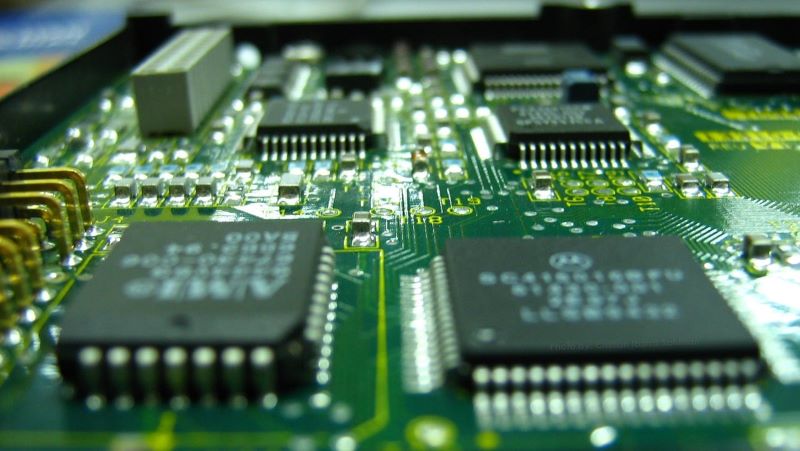
US chipmakers refuse to move focus from Chinese market despite Washington's restrictions
China continues to be a key market for a chunk of American chipmakers even as the United States tightens control on chip sales to the country and amid Beijing’s intense efforts for self-sufficiency in the semiconductor sector, media reports said.
According to data from S&P Global, major U.S. chip companies like Intel, Broadcom, Qualcomm, and Marvell Technology generate more revenue from China than from the U.S, a CNBC report said.
This trend is further emphasised by information from tech consultancy Omdia, which highlights China as the largest consumer of semiconductors, accounting for nearly 50% of global consumption as it is a leading player in assembling consumer devices, according to the report.
To counter China's growing technological prowess, the U.S. has imposed a string of export controls since October 2022, specifically to restrict China's access to advanced chip technology, especially the ones needed for AI applications, said the CNBC report.
Semiconductors are the critical components found in various products ranging from smartphones to electric vehicles, prompting governments worldwide to prioritise access to the best technologies and gain self-reliance.
Despite the export restrictions imposed by the U.S., American chipmakers have been able to take advantage of their technological superiority over their Chinese counterparts and benefit from the high demand in China, the report said.
This is possible because the U.S. export controls are targeted, allowing companies like Micron Technology, AMD, and Nvidia to continue effectively supplying their products to the Chinese market.
“There are still plenty of ‘high end’ chips with all types of allowable use cases that are good to go where U.S.-based chip companies have the dominant, leading edge,” said William B. Bailey, lead technology, media, and telecommunications analyst at Nasdaq IR Intelligence, according to the CNBC report.
When the initial wave of U.S. restrictions was implemented in late 2022, Nvidia and Intel made modified versions of their AI chip products specifically to serve their Chinese clients.
However, a year later, the U.S. updated its export rules to address alleged loopholes.
Despite this, reports emerged that Nvidia was developing a new chip tailored for China.
Intel reportedly continued fulfilling large orders of laptop processor chips to Huawei, a U.S.-sanctioned Chinese telecoms company, making use of an export license granted by the Trump administration, according to the CNBC report.
AMD also modified an AI chip for China but was interrupted by regulatory hurdles in securing an export license.
The report said Intel, Qualcomm, and Nvidia executives were reportedly part of a group pushing Washington against tighter chip restrictions in July last year.
These companies are also members of the Semiconductor Industry Association, which advocated for easing tensions and halting further sanctions due to the importance of the Chinese market for domestic chip companies.
In response to U.S. policies, China has taken retaliatory measures. In May last year, chips manufactured by Micron, an American company, were prohibited from critical information infrastructure in China after failing a review by the country's Cyberspace Administration, stated the report
Despite these challenges, Micron is expanding its presence in China by constructing a new assembly and test manufacturing facility in Xi'an, the CNBC report said.
The company considers China a key market, and production at the new facility is expected to kick-off in the second half of 2025.
In response to restrictions imposed by countries like the U.S. and the Netherlands on its access to advanced technology, China has been building efforts towards self-reliance by bolstering its domestic semiconductor industry.
Beijing has diverted substantial funds towards subsidies to support its chip firms, aiming to enhance domestic manufacturing capabilities.
An examination of Huawei's Mate 60 Pro smartphone conducted by TechInsights revealed the presence of an advanced chip manufactured by China's leading chip maker, SMIC. Despite U.S. sanctions targeting Huawei's access to 5G technology, the smartphone reportedly incorporates 5G connectivity, according to the CNBC report.
The Chinese government is increasingly stressing the importance of local chip procurement by its firms.
The substantial efforts and potential successes may take away the market share of foreign companies in China unless they possess a significant technological edge over domestic competitors.
Chinese firms are advancing in innovating legacy chips used in various applications, yet Morningstar's Lee suggests a full supply chain transformation may not happen, the CNBC report said.
However, these older, lower-end semiconductors make up 60% of China's manufacturing output, per U.S. Commerce Secretary Raimondo.
Meanwhile, Counterpoint Research's Wang notes Nvidia and Intel maintain a three to five-year technological lead over Chinese competitors in the AI GPU market, it added.
Support Our Journalism
We cannot do without you.. your contribution supports unbiased journalism
IBNS is not driven by any ism- not wokeism, not racism, not skewed secularism, not hyper right-wing or left liberal ideals, nor by any hardline religious beliefs or hyper nationalism. We want to serve you good old objective news, as they are. We do not judge or preach. We let people decide for themselves. We only try to present factual and well-sourced news.







